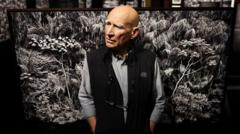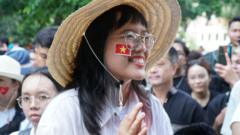The Vietnam War, which officially concluded on April 30, 1975, remains an indelible chapter in history, not only for its tragic events but also for the powerful imagery that captured its essence. This war, often referred to as the first "living room war," was uniquely experienced through the lens of photojournalists whose images brought the brutal realities of combat into American homes, shaping public opinion and political discourse.
As Damien Cave notes, the most poignant photographs taken during this period encapsulate both the heroism and horror that characterized the conflict, forcing viewers to confront the suffering and volatility inherent in war. Photographers from diverse backgrounds and ideological stances — including pioneering female journalist Dickey Chapelle, known for her fierce anti-Communist sentiments, and Tim Page, whose rebellious spirit stood in contrast to the traditional war narrative — documented the chaos with a blend of artistry and emotional depth.
These compelling visuals were more than mere depictions of conflict; they sparked critical conversations about morality, patriotism, and the effects of warfare on humanity. They illustrate a lesson that resonates even today: the importance of compassion and understanding when facing such devastating realities. The lasting legacy of Vietnam War photography continues to influence how wars are portrayed and perceived worldwide.
As Damien Cave notes, the most poignant photographs taken during this period encapsulate both the heroism and horror that characterized the conflict, forcing viewers to confront the suffering and volatility inherent in war. Photographers from diverse backgrounds and ideological stances — including pioneering female journalist Dickey Chapelle, known for her fierce anti-Communist sentiments, and Tim Page, whose rebellious spirit stood in contrast to the traditional war narrative — documented the chaos with a blend of artistry and emotional depth.
These compelling visuals were more than mere depictions of conflict; they sparked critical conversations about morality, patriotism, and the effects of warfare on humanity. They illustrate a lesson that resonates even today: the importance of compassion and understanding when facing such devastating realities. The lasting legacy of Vietnam War photography continues to influence how wars are portrayed and perceived worldwide.





















